by Keisam Pradipkumar
My recent visits to Ukhrul district and Phayeng village stirred me to chew over on the clandestine nature of human trafficking, compelled migrations, unabated heinous crimes against hapless women and children vis a vis globalization and prevailing system of political and economic injustice. As saying goes, that seeing is believable, I made attempts to scan what would be behind the scene I did see. What I saw at Ukhrul was nothing but the visiblemass exodus of young girls to metro cities of the country. Was it that case of brain drain as most of them speak English, smart and energetic; or migration by choice for better social and economic options, or was it linking with human trafficking for varied reasons in a clandestine way? Appallingly, even a remote village with a small population of 270 had unofficial record of group migration of 20 young girls to outside states. During the past one decade or so, several hundreds of girls had reportedly abandoned their native villages for their destination to different strange cities.
Every one agrees that Tangkhul girls are admired for exceptionally nice-looking, hard working, and much sought after for warm hospitality to the guests. My probing mind got jolted, this time, as wherever we reached at any village, we were served tea or warm water only by a horde of middle aged women, not by young girls. My question was - where had all the teenagers just vanished off the face of the earth? It poked me to remember the shocking profile of AIDS devastated Uganda, where its entire younger population (those who are in the sexually active and productive age group) was inflicted and engulfed by HIV/AIDS pandemic, leaving behind surviving small grandchildren with grandpa and grandmas only.
Observing the hardships faced by underprivileged people, It was starkly evident that globalization and urbanization have rendered a ripple effect to the impoverished economy, particularly the hill economy, which is utterly depended on cyclic Jhoom cultivation and diminishing forest products. The strait jacketing Globalization process in Manipur, under which no productive base infrastructures are embedded, truly a developmental aggression, brings out new sophisticated lifestyle based on costly consumerism. Since there is no equal distribution of economic opportunities, globalized commodities only widen the gapping chasm between have and have-nots. Many families could not meet the ever rising demands of a costly globalized lifestyle. While the have-nots being lured, try to embrace the upcoming neo liberal economic challenges risking one’s own life, compromising moral and ethical obligations. Many promising young girls from valley and hills who dared to struggle for a better life in the globalised market, ended with terribly upset stories, as they were betrayedand exploited after being lured.
Interacting with some villagers, they revealed that these vanishing youths left for Mumbai, Delhi, Chennai and other cities, where they have reportedly managed to get good jobs being offered by different “Companies”. But villagers could not promptly give the details ofcompanies, job specifications, personal security etc. It is a fact that girls from north-east particularly from Manipur are still distained to bear the brunt of racial discriminations in mainland cities of Mera Bharat Mahan, specially the capital Delhi. I could read the apprehensions of the village elders that were buried under their sly smiles. Because the barbaric expression of racial discrimination such as physical assault, verbal abuse, sexual harassments, gang rape and murder as perpetrated by some mainland Indians had inflicted many Naga and Meitei girls. One Ramchanphy Hongray (19) from Ukhrul who was murdered October last year apparently for resisting rape attempt at the apartment of 80/A at Munirka, Delhi being the latest victim.
The other day when I visited Phayeng, a Meitei schedule caste village, I met those traumatized three children left behind by a young widow, who was murdered along with her teenaged daughter after gang rape. The gruesome murder only depicted the magnitude of immeasurably insecure lives of socially deprived section of the society, such as widows, destitute children and orphans in our society. That widow struggled to afford her fourchildren’s education, who all were studying at Donbosco School, challenging every foreseeable constraints and vulnerabilities she went through. That spirit and courage deserved reverence. However, the fragile co-operation of the locality in addition to laxity of police impeded the progress of crime investigation on the murder case. It’s an awful picture.
Interestingly, security forces came up to showcase their good Samaritan gesture overriding legal procedures, when they dumped the three children left behind by late Chanbi to an orphanage. Next turn is of revolutionary justice of underground outfits, if any, that also seemingly a far cry for the downtrodden people. State or nonstate, armed or unarmed groups – it makes less different, to the deprived people nowadays, for them ultimate justice is being throttled on many cases. The present conflict torn society, where rule of law got spirally collapsed, it’s a hey-day only for criminals.
Then, do we have legitimate moral rights to be proud of “Nupi Lan” (women’s uprising) fought against British imperialist and for the contemporary “Meira Paibee Movement” against narcotics, alcoholism and human rights violations? Why should we take to mean “Ima Keithel” one of the largest markets in the world exclusively run by women, as a symbol ofOriental liberal society and unique social status of Manipuri women? Would Sharamila be happy with the prestigious titles like “Iron Lady” or “Nura Temshingnabi” when the same society who conferred her the titles still continues to murder and gang rape of many hapless women and girls?
It is the high time to redefine the true value of campaign and observations, self introspection, redesigning the advocacy strategies, refocusing to outcomes by avoiding the tokenism and ceremonial aspects from the activities. Ever escalating crimes against women and children just during and after the observances, including the recently held Children’s day on 14November, 16 days Activism Against Gender violence Campaign started from 25 November, International Human Rights day on 10 December, Nupi Lan on 12 December speak volumes of the ineffectiveness of these observances, rallies and consultations so far. Are we somewhat misfiring or do we get backfired?
State fails to take up short and immediate measures on the recent Phayeng rape and murder incident. There has been no effective crime investigation, culprits are moving scot-free, besides no rehabilitative process for the children left behind by the widow is taken up. Consequently, judiciary and police investigation could not offer trust to the public, who have opted an alternative justice – mob trail and mob justice. State police are pro-active only to counter insurgency operations under the shadow of impunity of AFSPA. Culprits of many heinous crimes hardly get punitive punishment. Highly exposed case of Miss Manorama, allegedly murdered after gang rape and custodial torture of one Miss Naobi Chanu by state police commandos passed off without awarding any punishment to the culprits. It is stated that In India, 22 women were killed each day in dowry-related murders in 2007 while, In Guatemala, two women are murdered, on average, each day. Nobody knows- how many of Manipuri women and girl children must have been killed, tortured, raped, harassed, kidnapped and trafficked each day on this earth?

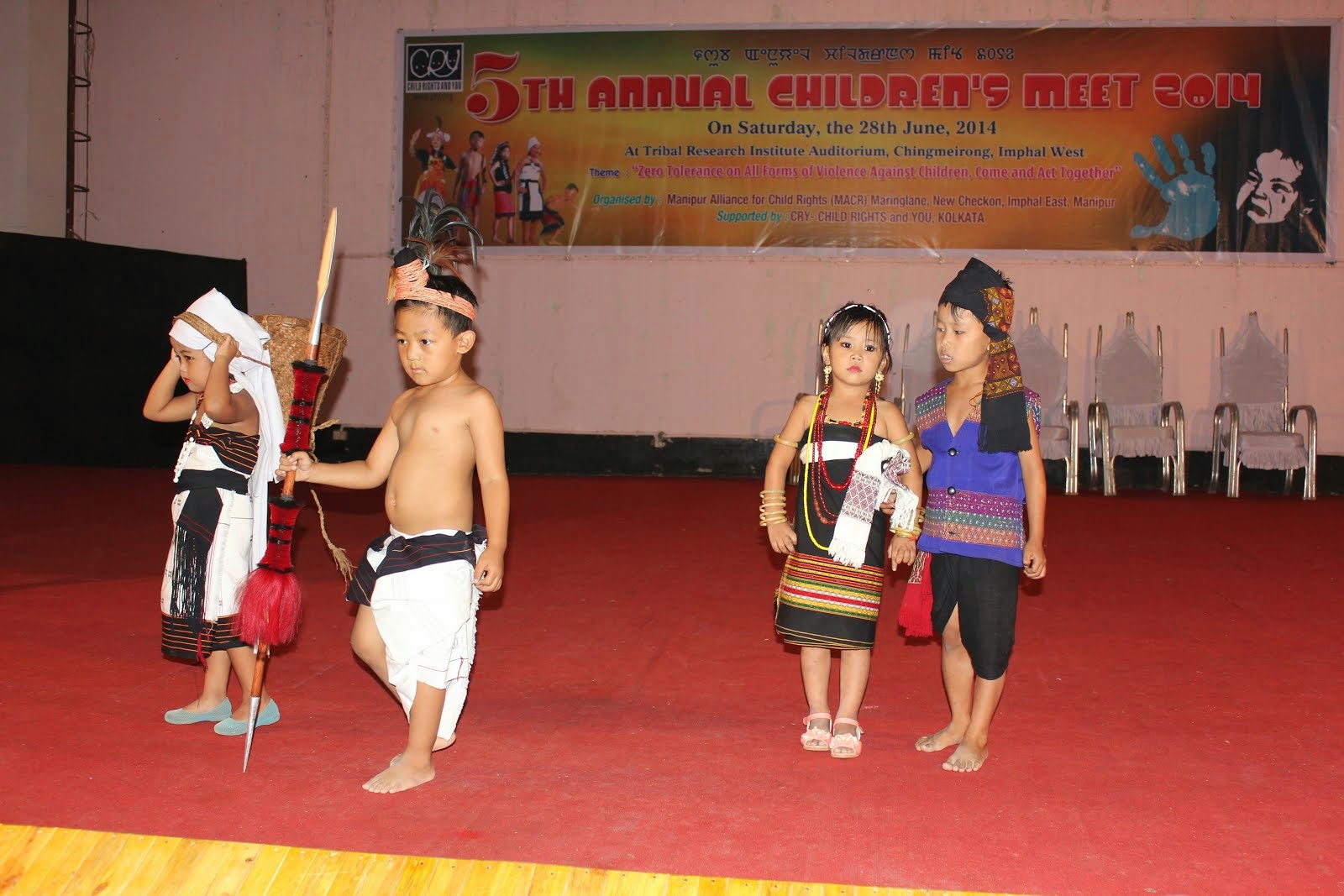

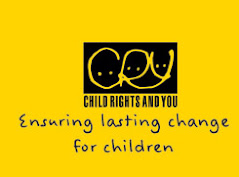





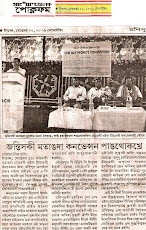

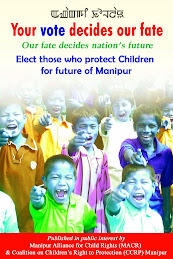





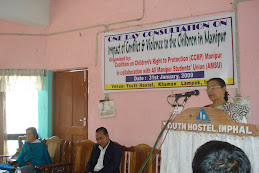
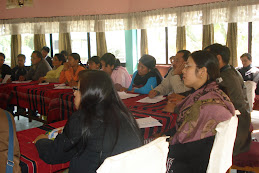
No comments:
Post a Comment